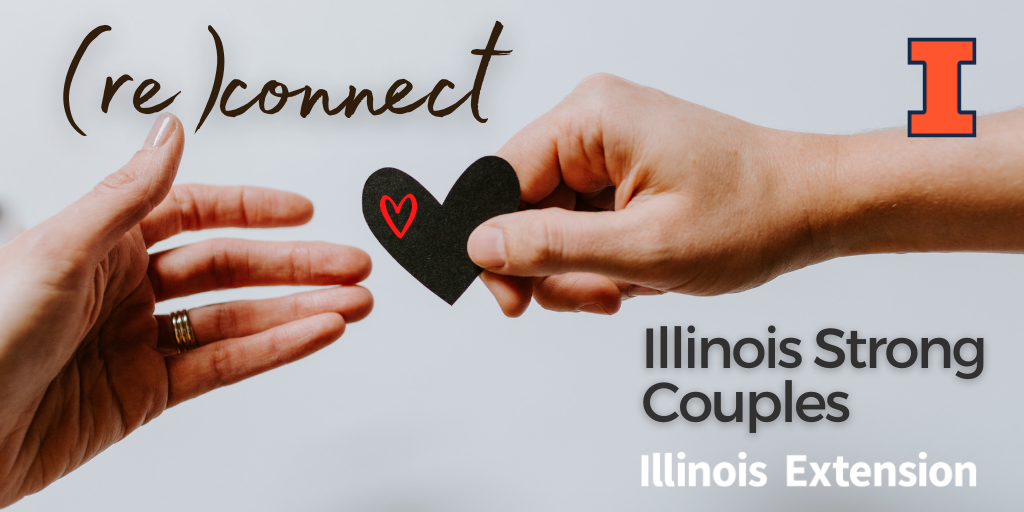New online, research-based program aims to strengthen relationships

URBANA, Ill. – Stressors in life, including the challenges of the current COVID-19 pandemic, can take a toll on marriages and other close, intimate relationships. Family studies researchers at the University of Illinois, in partnership with University of Illinois Extension, are addressing this issue by launching a new online program for Illinois couples seeking help for their relationship.
With the recently released Illinois Strong Couples project this help is now just a click away.
“Anybody who’s been married for say, a week, knows that marriages and close relationships are difficult, oftentimes harder than we first realized they were going to be,” says Allen Barton, assistant professor in the Department of Human Development and Family Studies at U of I, and an Extension specialist.
But Barton says science shows these relationships are worth working on. “We have a wealth of empirical findings that show how important they are, whether that's for individuals’ mental health, for their behavioral health, for kids, for communities, or for workplaces. The quality of these intimate relationships is really central to so many other areas of our lives,” he adds.
The new Illinois Strong Couples project will utilize the ePREP program for couples, which Barton explains is one of the most scientifically based programs for strengthening couple relationships.
“A recent large, national study involving the ePREP program found fairly pronounced effects and positive benefits,” Barton explains. The study cited greater relationship satisfaction, improvements in communication and emotional support, less intimate partner violence, and fewer concerns about breaking up or instability in the relationship among couples who went through the ePREP program compared to those who did not.
Individually, ePREP participants also reported less perceived stress in their lives, better sleep, and less problematic alcohol use after completing the program compared to individuals in the control condition.
The ePREP program, fully delivered online, recently added a program “coach” feature for couples participating in the program.
“I sometimes use the analogy of a personal trainer. You can do your exercise program, but then you have that coach who comes alongside you, giving you some guidance, instruction, motivation, and encouragement,” Barton says.
Barton gathered a team of Extension educators across Illinois and spent the summer training them as ePREP “coaches,” familiarizing them with the ePREP approach to cognitive behavioral interventions.
“One of our goals as Extension specialists and educators is to get practical, useful, relevant information from research into the lives of residents in our state,” Barton says. “With this project, we’re coming with some of the best research that's being done and using that to improve the lives of residents throughout the state of Illinois.”
University of Illinois Extension will also help fund parts of the program so there is no cost to the couples who participate.
The online format allows couples to do the program in the comfort of their own home, on their own time.
“One of the things we really instill in couples is that every couple is going to have challenges and things that they will have to work through. And we want them to know, they can do that. Here are some research-tested skills, ways of thinking, and ways of interacting together that will really help your relationship,” Barton says.
COVID-19 has been hard in a lot of ways, and relationships are no different, Barton says. “The general sense among scholars who have looked into this is that couples that were doing pretty well before the pandemic, probably are still doing pretty well. But for couples that maybe were already grating at each other a little bit, had some type of underlying issue or conflict, or were just in a rough spot, COVID just made that worse.
“On average, stressful experiences lead to declines in relationship quality. And so we hope this new program is going to be really timely for couples.”
Providing a quick walk through the program, Barton says interested participants will visit the project website and take a simple screening to make sure they're eligible. Partners will then be emailed a link that asks each partner to consent to participate in the project as well as complete a baseline survey. Next, a program coach will contact the couple about scheduling their first coach call and getting access to the ePREP program.
To be eligible for the project, mixed- or same-sex couples must be 18 years or older; Illinois residents; and married, engaged, or living together for at least six months.
The program is six sessions, each taking about an hour for couples to complete. After every two sessions, there's a 20-minute coach check-in call, during which they review the material and do some actual practice of what's been discussed.
“While the coaches are not therapists, they are coming alongside, making sure that technique is done right, providing the encouragement, the modeling, as needed to make sure that you can do it right. And really building that sense of efficacy or confidence in a couple goes a long way.
“Oftentimes, when things are hard, you feel there's not any hope and you feel stuck. This is a superb way to get unstuck,” Barton says.
Interested couples can sign up now at go.illinois.edu/IllinoisStrongCouples.
As part of a research evaluation of the program, the first 200 couples who enroll in the project can together earn up to $150 in Amazon gift cards for completing three surveys over a six-month period. Information from these surveys will help researchers understand the effect of the program on individuals’ relationship and personal well-being.
The Department of Human Development and Family Studies is in the College of Agricultural, Consumer and Environmental Sciences at University of Illinois.